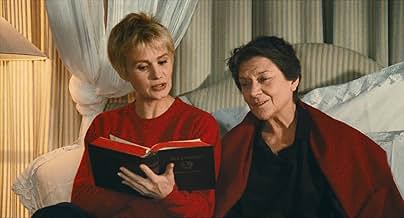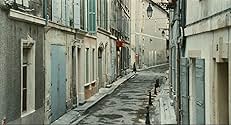NOTE IMDb
7,0/10
1,9 k
MA NOTE
Constance aime lire. A tel point que ses lectures et ses rêves sont intimement mêlés. Aussi écrit-elle un roman qui raconte les aventures de Marie, une jeune femme qui aime tellement la lect... Tout lireConstance aime lire. A tel point que ses lectures et ses rêves sont intimement mêlés. Aussi écrit-elle un roman qui raconte les aventures de Marie, une jeune femme qui aime tellement la lecture qu'elle décide de devenir lectrice à domicileConstance aime lire. A tel point que ses lectures et ses rêves sont intimement mêlés. Aussi écrit-elle un roman qui raconte les aventures de Marie, une jeune femme qui aime tellement la lecture qu'elle décide de devenir lectrice à domicile
- Réalisation
- Scénario
- Casting principal
- Récompenses
- 4 victoires et 8 nominations au total
María Casares
- La veuve du général
- (as Maria Casarès)
Avis à la une
Even the most ardent bibliophiles have to set aside their books when the theater lights go down, but this playful French import at least offers some consolation, in a sense attempting to approximate with the written word what Juzo Itami did with noodles and egg yolk in 'Tampopo'. One of the joys of a good book is of course the vicarious thrill of escapism, something Miou-Miou discovers firsthand while reading Raymond Jean's novel (of the same name as the film) and imagining herself as its protagonist: a professional reader who finds her choice of books somehow reflecting the idiosyncrasies of each client. This is clearly a film working on several levels at once, but a refresher course in European literature may be required to fully appreciate it. The visual scheme is offbeat and arresting, bringing the pages of each selected novel to colorful life, but the script is perhaps too infatuated with its own love of language, creating an elegant and infuriating puzzle where the patterns of each separate piece are more attractive than the finished picture.
This is a slightly bizarre film, a bit like a pretentious European soft porno movie from the 1970ies, minus the sleaze. I have seen it before in a dubbed version, back when it first came out, and didn't get it -- the movie relies heavily on the original dialogue. This time I saw the French version, and, although I still can't say that I managed to penetrate into the story's every nook and cranny, I can testify that the dialogue is quite witty, the wit is farcical, and Miou-Miou is adequately sensual. And that's more than you can say for most movies these days. It won't make it into my personal list of desert island films, but I'm genuinely glad to have given it another go.
10mew-4
Our protagonist, played by Miou-Miou, is a mischievous, whimsical and smart young woman who is looking for an occupation that will engage her. The adventures she has during her fantasies of what the job as a travelling reader would be, are charming little trips that we take with her. This is a smart and engaging little film. I dare you to not fall in love with her or this film.
The basic virtue of this beautiful film is to preserve and use, in beautiful manner, all the flavors of the novel. The second, no doubts, Miou - Miou. But she can not be exactly surprising. A film about books and the adventures having the books as seeds. More precise, a film about freedom.
The output of director Michel Deville is difficult to categorise, assuming one feels the need to do so. He is nothing if not varied. Between 1985 and 1988 he gave us the erotic thriller 'Peril en la Demeure', probably his most successful film, followed by the bizarre and surreal 'Paltoquet' which must be accounted a noble failure and finally the delightful 'La Lectrice'.
This is to my knowledge the only one of Raymond Jean's novels to be filmed so all credit to Michel and Rosalinde Deville for spotting the potential. It is the type of film generally referred to as being 'very French'. If by that is meant stylish, literate, well-constructed, tastefully erotic and caring more about character than plot then it certainly qualifies.
It is essentially about where reality finishes and fantasy begins as Constance the book lover and Marie the professional book reader, both played by the sensuous and enchanting Miou-Miou, call to mind very strongly William Styron's observation that 'one lives several lives while reading.'
The rather quirky clients who hire her to read aloud to them prefer subject matter that reflects their lives and predilections. The handsome young man confined by an accident to a wheelchair asks her to read one of Baudelaire's most erotic poems, one of six of his that were banned in 1857. The lonely businessman has a taste for pornography but has to settle for 'The Lover' of Duras although in his case Marie's actions speak louder than words. The general's widow loves the prose of Karl Marx(!?) whilst the magistrate has a penchant for de Sade's '120 Days of Sodom.' The expression on Marie's face when her eyes light upon the extract he has chosen is absolutely priceless.
As the businessman Patrick Chesnais picked up a César and in the cast are two splendid representatives of the 'old school' namely Pierre Dux as the magistrate and Maria Casares as the widow.
The Production Design and Art Direction are superb and Deville again utilises classical music to great effect. Here it is Beethoven who does the honours.
This piece is really to do with the power of words and how vital they are in both enriching the mind and unlocking the imagination. As such, alas, it is a voice crying in the wilderness to so many of the current generation who spend their waking hours glued to screens.
This is to my knowledge the only one of Raymond Jean's novels to be filmed so all credit to Michel and Rosalinde Deville for spotting the potential. It is the type of film generally referred to as being 'very French'. If by that is meant stylish, literate, well-constructed, tastefully erotic and caring more about character than plot then it certainly qualifies.
It is essentially about where reality finishes and fantasy begins as Constance the book lover and Marie the professional book reader, both played by the sensuous and enchanting Miou-Miou, call to mind very strongly William Styron's observation that 'one lives several lives while reading.'
The rather quirky clients who hire her to read aloud to them prefer subject matter that reflects their lives and predilections. The handsome young man confined by an accident to a wheelchair asks her to read one of Baudelaire's most erotic poems, one of six of his that were banned in 1857. The lonely businessman has a taste for pornography but has to settle for 'The Lover' of Duras although in his case Marie's actions speak louder than words. The general's widow loves the prose of Karl Marx(!?) whilst the magistrate has a penchant for de Sade's '120 Days of Sodom.' The expression on Marie's face when her eyes light upon the extract he has chosen is absolutely priceless.
As the businessman Patrick Chesnais picked up a César and in the cast are two splendid representatives of the 'old school' namely Pierre Dux as the magistrate and Maria Casares as the widow.
The Production Design and Art Direction are superb and Deville again utilises classical music to great effect. Here it is Beethoven who does the honours.
This piece is really to do with the power of words and how vital they are in both enriching the mind and unlocking the imagination. As such, alas, it is a voice crying in the wilderness to so many of the current generation who spend their waking hours glued to screens.
Le saviez-vous
- AnecdotesFrance's official submission to the 1989's Oscars in the Best Foreign Language Film category.
Meilleurs choix
Connectez-vous pour évaluer et suivre la liste de favoris afin de recevoir des recommandations personnalisées
- How long is The Reader?Alimenté par Alexa
Détails
Box-office
- Montant brut aux États-Unis et au Canada
- 699 397 $US
- Montant brut mondial
- 699 397 $US
Contribuer à cette page
Suggérer une modification ou ajouter du contenu manquant












